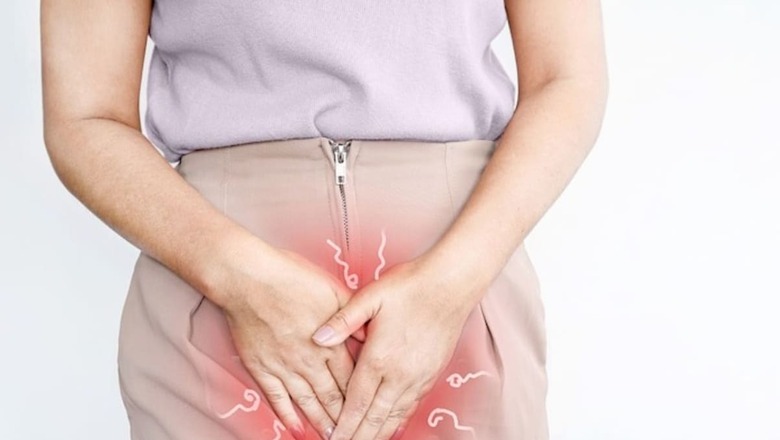
views
Excessive menstrual bleeding, characterized by periods lasting more than 7 days or an abnormally heavy flow, can significantly impact a woman’s well-being. Frequent and irregular menstrual bleeding, occurring less than every 21 days, can detrimentally affect the quality of life. Root causes of heavy menstrual bleeding encompass conditions such as fibroids, polyps, uterine cancer, pelvic inflammatory disease, adenomyosis, and endometriosis.
For many women, periods can be uncomfortable, but excessive or irregular bleeding is not to be ignored. Menstrual flow that requires changing a pad or tampon every hour or two, passing large clots, or experiencing prolonged periods that last more than a week could be indicative of endometriosis. While these symptoms alone may not confirm the condition, they serve as red flags warranting medical attention.
Dr Neha Gupta, Senior Consultant, Obstetrics and Gynaecology, Fortis Hospital, Noida, says, “Heavy menstrual blood loss is often associated with painful cramps. Cramps during periods are many times thought of as normal in young girls. People need to be aware that if their painful cramps during periods seem to be worsening over subsequent cycles and the pain is disproportionate to the amount of flow then this could be a sign and symptom of endometriosis. It is advisable to rule out endometriosis which if not diagnosed early may cause chronic pelvic pain as the disease has a tendency to spread.”
Heavy or irregular bleeding during menstruation can be more than just a monthly inconvenience; it may be a signal of an underlying health issue, such as endometriosis. “Endometriosis is a chronic condition where tissue similar to the lining of the uterus grows outside the womb, causing a range of symptoms, including pelvic pain, fertility issues, and, notably, abnormal menstrual bleeding,” explains Dr Seema Sehgal, Director, Dept of Obstetrics & Gynaecology, CK Birla Hospital (R), Delhi.
Endometriosis affects around 1 in 10 women their reproductive years, making it a prevalent concern. The abnormal growth of tissue outside the uterus can lead to inflammation, scarring, and the formation of adhesions. Consequently, the menstrual cycle becomes disrupted, giving rise to heavy or irregular bleeding patterns.
Explaining Endometriosis
Endometriosis is a problem affecting a woman’s uterus—the place where a baby grows when a woman is pregnant. “In endometriosis the tissue (glands and stroma) that normally line the inner uterine cavity grows somewhere else. This abnormally placed tissue responds to female hormonal stimulation and causes bleeding during menstrual periods. The tissue can grow on the ovaries, behind the uterus, on the bowels, or on the bladder. When this tissue grows in the muscles of the uterus, a condition called adenomyosis, it may cause smooth enlargement of the uterus. The collection of blood at these places causes chemical irritation and adhesion formation with adjacent structures which subsequently results in pain, infertility, and heavy periods. Pelvic congestion causes heavy and painful periods in endometriosis and adenomyosis,” shares Dr Gupta.
Other symptoms of endometriosis may be painful passage of stools during periods and pain during sexual intercourse.
When To Consult A Healthcare Professional?
Dr Sehgal believes, “Women experiencing heavy or irregular bleeding should consult with a healthcare professional for a comprehensive evaluation. A healthcare provider may conduct a physical examination, review medical history, and, in some cases, recommend imaging studies or laparoscopic surgery for a definitive diagnosis.”
Early detection and management of endometriosis are crucial for alleviating symptoms and preserving fertility. “Various treatment options, including medications and surgical interventions, can help manage the condition. Additionally, adopting a holistic approach that includes lifestyle modifications and pain management strategies can contribute to improved quality of life for individuals with endometriosis,” opines Dr Sehgal.
Doctors may be able to predict the disease based on history and examination. Evaluation may be done by a trans vaginal ultrasound or MRI. Diagnostic laparoscopy and tissue biopsy is sometimes needed.
Treatment
The treatment includes painkillers. Birth control pills are effective in making periods regular as well as decreasing the heavy blood flow due to endometriosis.
Fertility-sparing surgery can be offered for pain relief in young. “Definitive treatment may be needed in advanced cases when fertility is not desired. Radical surgery like total hysterectomy with bilateral oophorectomy (TAH-BSO) and cytoreduction of visible endometriosis with adhesiolysis is performed in such cases,” adds Dr Gupta.
In conclusion, heavy or irregular menstrual bleeding should not be dismissed as a mere inconvenience. Instead, it should be viewed as a potential sign of underlying health issues, such as endometriosis. Seeking prompt medical attention empowers women to address their concerns, obtain an accurate diagnosis, and embark on a journey towards effective management and improved well-being.




















Comments
0 comment